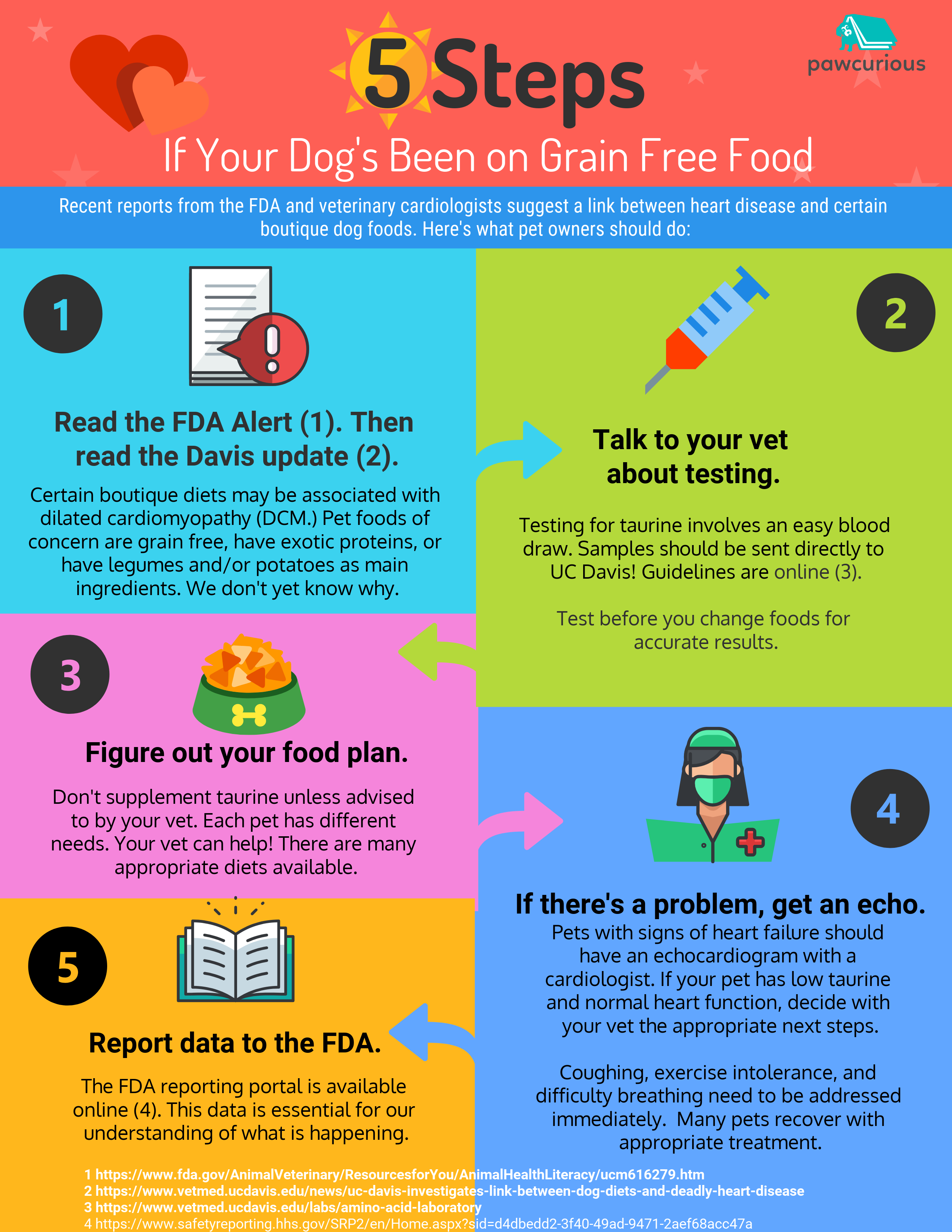What You Should Know About the FDA Alert on Grain Free Dog Foods
A recent FDA alert about the possible connection between grain free diets and dilated cardiomyopathy has been gaining momentum. I’m getting tons of questions about it, and I’m learning as much as I can too. Let me start by saying this: we ALL want what’s best for our pets. We might have different approaches for getting there, but that’s the goal.
For the video version, check out my interview with Dr. Lisa Weeth, DVM, DACVN: You can tell by my intense face we were having a GREAT conversation.
The Concern:
That certain categories OF dog foods may inadvertently contribute to heart disease by interfering with the uptake or utilization of taurine, an amino acid vital to heart function.
How It Came About:
A few puzzle pieces came together. Dr. Joshua Stern, a cardiologist at UC Davis, started noticing an increased number of dilated cardiomyopathy cases in Golden Retrievers- above what is normally expected. We’re also knee-deep in the Morris Animal Foundation Golden Retriever Lifetime Study with a wealth of Golden-specific data at our disposal, including diet history. The common factor in this uptick seemed to be the diets the dogs were eating.
After talking to cardiologists around the country, they found the increase in cases wasn’t limited to Goldens, but the diet factor was still there.
The trend started to take form.
What We Know:
There seems to be a correlation between the following categories of foods and dilated cardiomyopathy:
- Boutique (small manufacturer)
- Exotic Ingredients (protein sources like rabbit, duck, things other than chicken or beef)
- Grain Free (legumes such as peas and lentils, or potatoes as a main ingredient)
What We Don’t Know:
We don’t know why, exactly, this is happening. There are theories. We don’t know if the ingredients interfere with taurine uptake and/or utilization, or if they simply aren’t present in the ingredients in sufficient numbers. This is where everyone needs to pause and take a breath and support the research that needs to happen to GET those numbers. If you want a deeper dive into the science, check out Linda Case’s piece.
We don’t know if it’s just about the ingredient list. Making blanket statements without real data (corn is bad!) is how we got here in the first place. We don’t know if it’s peas that are bad, or the combination of peas and something else, or if it’s a problem with poorly sourced ingredients, or manufacturing, or formulation, or… we don’t know.
Is the problem truly grain free or does it only look that way because the actual problem is small companies with manufacturing errors, who just happen to make grain free because that is what sells?
It’s very likely more complicated than just PEAS ARE BAD or THIS BRAND GOT IT WRONG. Guys, we don’t know yet. Very smart people are working on it.

Download the infographic!
What Are the Signs of DCM?
Weakness, shortness of breath, exercise intolerance, coughing. If your pet is on a suspect diet and is exhibiting those signs, call your vet today! (well, even if they’re not on a grain free diet you should call because that’s not normal.)
I’m Using a Diet In These Categories and My Pet Seems Fine. What Now?
It is entirely possible, and hopefully likely, that your pet is fine. So first, don’t panic.
Step one, as always, talk to your vet. If it were me, I’d consider transitioning to a diet from a manufacturer who’s been around a while (Dr. Weeth suggested at least one generation of dogs, a company at least 15 years old). As of early September, none of the grain free pet foods from, how is it said, “big pet food” have been problematic. If your pet doesn’t NEED grain free, consider a diet with grain.
If you love the food you’re on and would prefer not to change, you may want to consider having your pet’s taurine levels tested. More on that below.
My Vet Says This is Overblown.
We do live in an age of rapid hysteria. Yes, we’re at under 200 cases right now, small beans in the big picture. But if we can stop just one more case, isn’t it worth having this discussion? Best case scenario, your pet is fine and you have nothing to worry about. Yay! Submit your data to the Taurine Deficiency FB group and consider it your fine contribution to research.
This is new. I learn things from clients and pet owners all the time. In this case, it’s not some rando making a wild proclamation: it’s the scientists at ground zero sounding the alarm.
If your vet isn’t aware of this issue, it’s not a terrible thing. We all have a million things going on, this is fairly recent, and not everyone is Golden Retriever obsessed like me. If you tell them, “Hey, the FDA has a warning out about this food I’ve been using, the vet schools are concerned, the cardiologists have been seeing heart disease in dogs on this diet, can we do a blood test?” I would hope they say yes. Why not? Testing is super easy. Here’s what you bring with you to the clinic:
PAGES YOU TOTALLY SHOULD PRINT OUT THAT COME FROM AUTHORITATIVE EXPERTS:
The FDA Warning
The UC Davis Statement 1
UC Davis Statement 2
UC Davis Amino Acid Laboratory Submission Guidelines
How Do We Test For Taurine?
It’s a simple blood draw, but it needs to be done correctly and the right samples need to be collected. The sample should be sent straight to Davis, as the results seem to be variable between different labs and Davis has the reference ranges we’re working with. Davis will bill you, the owner, directly for the test. Vets usually charge a fee for sample collection and preparation, but you can pay for the actual lab test yourself.
This is a deviation from most clinics’ normal lab procedures.
Well Thank God I’m Home Cooking! See, Kibble Really Does Suck!
This isn’t about who’s a better owner or who cares more or does a better job. Vets see plenty of taurine deficiency cardiomyopathies from people home cooking an imbalanced diet they found online. It is a choice to cook, and a lovely one, but it also needs to be done right, preferably with the guidance of a nutrition service like BalanceIt.
It’s not kibble vs home cooked. It’s knowledge, love, and trying to do the best by your pet no matter what.

I got skin in the game too. This is my little dude Ollie, and I want him to live forever.
Disclaimer: I’m by no means the expert on this. Dr. Josh Stern, a cardiologist at Davis has been at the heart of this (pun intended) since the start and has been extraordinarily generous with his time on Facebook talking to pet owners. I’m summarizing the info I have from his groups and my conversation with Dr. Weeth (her blog is awesome! I always learn something new.) They know a lot more about this than me; my job as a general practice DVM is interpreting as best I can for you all. I will update this page as information changes, or corrections are needed.
